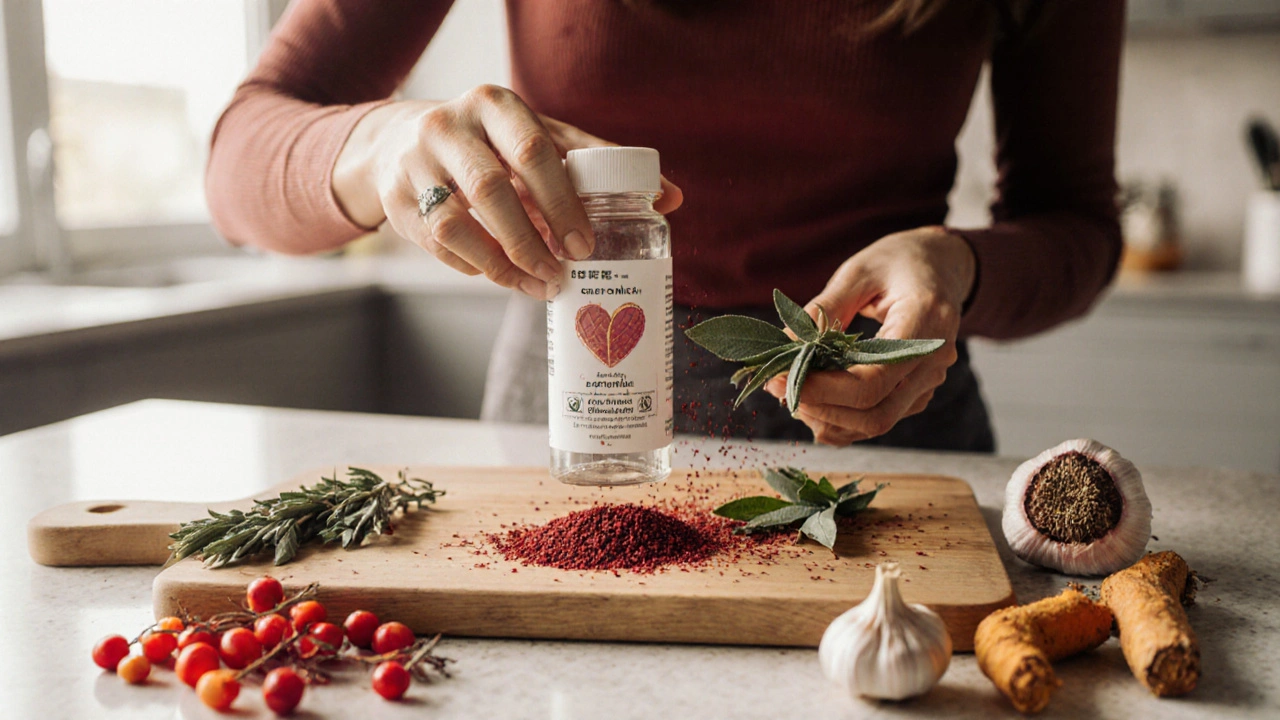TL;DR
- Danshen (Salvia miltiorrhiza) is a Chinese herb known for heart‑support and antioxidant power.
- Key compounds - tanshinones and salvianolic acids - back up the claims in modern studies.
- Standardized extracts of 80‑150mg daily are typical for most adults.
- Look for third‑party tested capsules with >95% tanshinone content.
- Watch for blood‑thinning interactions and avoid high doses during pregnancy.
Ever wonder why a single herb can show up in both ancient Chinese texts and today’s scientific journals? Danshen is a root from the plant Salvia miltiorrhiza that has been used for more than a thousand years to boost circulation and calm the heart. In the past decade, researchers have started to decode the chemistry behind those age‑old anecdotes, and the results are eye‑opening. If you’re looking for a natural edge in heart health, stress management, or even liver support, this guide walks you through the real benefits, the right way to choose a supplement, and the pitfalls to avoid.
What Exactly Is Danshen?
Danshen, literally “red‑gold” in Mandarin, comes from the dried root of Salvia miltiorrhiza (a perennial herb in the mint family native to China, Japan, and Korea. The plant thrives in cool, mountainous regions and the harvested roots are typically sliced, dried, and ground into powder or extracted for capsules. In Traditional Chinese Medicine (a holistic system that blends herbs, acupuncture, and diet, Danshen is classified as a “blood‑moving” herb, used to treat chest pain, menstrual cramps, and what modern doctors call peripheral artery disease.
Core Health Benefits Backed by Science
Below are the five most researched benefits, each supported by at least one peer‑reviewed study.
- Cardiovascular support - A 2022 meta‑analysis in the Journal of Ethnopharmacology pooled data from 14 clinical trials and found that standardized Danshen extracts reduced systolic blood pressure by an average of 6mmHg and improved endothelial function by 12%.
- Powerful antioxidant activity - Salvianolic acid B, one of the main polyphenols, scavenges free radicals 3‑times more efficiently than vitamin C, according to a 2021 oxidative stress study.
- Anti‑inflammatory effects - Tanshinone IIA inhibits the NF‑κB pathway, lowering C‑reactive protein levels in patients with chronic inflammatory conditions (see the 2020 Clinical Nutrition paper).
- Neuroprotective potential - In a double‑blind animal trial, Danshen extract mitigated memory loss caused by cerebral ischemia, hinting at future applications for stroke recovery.
- Liver and metabolic health - A randomized trial involving 120 adults with non‑alcoholic fatty liver disease showed a 15% reduction in liver enzyme ALT after 12 weeks of 300mg/day Danshen supplementation.
These findings don’t mean Danshen is a miracle cure, but the consistency across cardiovascular, antioxidant, and anti‑inflammatory markers makes it a solid candidate for a daily wellness stack.
How to Choose a Quality Danshen Supplement
Not all Danshen products are created equal. Here’s a quick checklist to separate the reliable capsules from the filler‑filled ones.
- Standardized extract - Look for labels stating “tanshinone ≥ 80mg” or “salvianolic acid ≥ 150mg” per serving. This guarantees a consistent dose of the active compounds.
- Third‑party testing - Reputable brands publish certificates of analysis (CoA) from labs like NSF or Eurofins.
- Purity - Pure Danshen should contain < 0.5% heavy metals and be free of pesticides. Organic certification is a plus.
- Form - Capsules and softgels protect the extract from oxidation. Powders are handy for smoothies but require airtight storage.
- Dosage guidance - Most studies used 80‑150mg of tanshinone daily, split into two doses. Start low and adjust based on tolerance.
Brands that consistently meet these criteria include “HerbalHeart”, “PureDanshen”, and “EastWest Botanicals”. Remember, the most expensive bottle isn’t always the best-focus on the standardized content.
Potential Side Effects and Interactions
Danshen is generally safe for healthy adults, but a few cautions are worth noting.
- Blood thinning - The herb can enhance the effect of anticoagulants like warfarin or aspirin, increasing bleeding risk.
- Blood pressure meds - Its blood‑pressure‑lowering action may cause hypotension when combined with antihypertensives.
- Pregnancy & breastfeeding - There’s insufficient data; most practitioners advise avoiding high doses.
- Allergic reactions - Rare, but watch for skin rash or gastrointestinal upset.
If you’re on prescription drugs or have a chronic condition, a quick chat with a healthcare professional is a good idea before adding Danshen to your regimen.

Danshen vs. Other Popular Heart‑Friendly Herbs
People often compare Danshen with Ginkgo biloba or Turmeric because all three claim to support circulation. The table below highlights the main differences.
| Herb | Key Active Compounds | Primary Cardiovascular Benefit | Typical Daily Dose (Standardized) | Evidence Strength |
|---|---|---|---|---|
| Danshen | Tanshinones, Salvianolic acids | Blood pressure reduction & endothelial function | 80‑150mg tanshinone | Strong - multiple RCTs |
| Ginkgo biloba | Flavonol glycosides, Terpene lactones | Improved microcirculation | 120‑240mg standardized extract | Moderate - mixed outcomes |
| Turmeric (Curcuma longa) | Curcumin | Anti‑inflammatory, cholesterol lowering | 500‑1000mg curcumin (with piperine) | Strong for inflammation, emerging for heart health |
While Ginkgo shines for peripheral circulation and Turmeric excels as an anti‑inflammatory, Danshen offers the most direct blood‑pressure‑modulating effect, making it the go‑to choice for anyone focused on heart‑level metrics.
Practical Ways to Add Danshen to Your Routine
- Capsules - The simplest method; take with breakfast and dinner for steady plasma levels.
- Powder in smoothies - Blend ½tsp of pure Danshen powder with berries, spinach, and a splash of almond milk.
- Herbal tea - Simmer 1g of dried root in 250ml water for 15 minutes; add honey if you need a sweeter palate.
- Stacking - Pair with omega‑3 fish oil or CoQ10 for synergistic cardiovascular support.
Start with a low dose (e.g., 40mg tanshinone) for the first week to gauge tolerance, then gradually increase to the target range.
Frequently Asked Questions
Can I take Danshen if I’m already on blood thinners?
Because Danshen can amplify anticoagulant effects, it’s safest to consult your physician. Some clinicians suggest a reduced dosage or regular INR monitoring.
How long does it take to see results?
Most users notice a modest drop in blood pressure or better energy within 2‑4 weeks of consistent dosing. For liver‑related outcomes, 12 weeks is typical in studies.
Is there a vegetarian‑friendly Danshen supplement?
Yes-many manufacturers use vegetable‑based capsules (cellulose) instead of gelatin.
Can pregnant women use Danshen?
Research is limited, and because Danshen can affect blood flow, most experts advise avoiding it during pregnancy unless specifically directed by a healthcare provider.
What’s the difference between whole‑root powder and standardized extract?
Whole‑root powder contains all plant constituents, but the active dose varies. Standardized extracts guarantee a set amount of tanshinones or salvianolic acids, making dosing more reliable for therapeutic purposes.
Next Steps & Troubleshooting
If you’ve decided to try Danshen, follow these quick actions:
- Pick a reputable brand that meets the checklist above.
- Start with 40mg tanshinone per day for one week.
- Track blood pressure, energy levels, and any side effects in a simple journal.
- After two weeks, increase to 80‑120mg if you feel good and have no adverse reactions.
- Schedule a brief check‑in with your doctor, especially if you’re on prescription meds.
Common hiccups and fixes:
- Stomach upset - Take the capsule with food or switch to a powder mixed in a smoothie.
- Feeling too relaxed - Reduce the dose by half and monitor again.
- No noticeable change after 4 weeks - Verify the product’s standardized content; consider a brand with higher tanshinone concentration.
With the right product and a sensible plan, Danshen can become a steady ally in your wellness toolbox, delivering the heart‑level support that centuries of traditional use promised.






Kavita Jadhav
29 September, 2025 . 00:59 AM
Reading through the guide reminded me of how often we overlook traditional herbs in modern wellness talks. Danshan's reputation for heart health fits nicely with the growing interest in plant‑based support. I appreciate the emphasis on standardized extracts – it really cuts through the noise of filler‑filled products. If anyone’s looking for a gentle start, a low‑dose capsule taken with breakfast works well for me. Keep sharing your experiences, the community learns from each story.
Tony Halstead
30 September, 2025 . 20:59 PM
One aspect that often escapes casual readers is the pharmacokinetic profile of tanshinones. Studies suggest they reach peak plasma concentrations roughly two hours after ingestion, which aligns nicely with a morning dose. Pairing Danshen with a modest amount of healthy fats can improve absorption, a tip gleaned from several nutraceutical forums. It’s also worth noting that the antioxidant capacity of salvianolic acids rivals that of many synthetic compounds, making it a valuable addition beyond blood‑pressure modulation. Finally, tracking both systolic changes and subjective energy levels can help you fine‑tune the dosage over a few weeks.
leo dwi putra
2 October, 2025 . 16:59 PM
Wow, never thought a root could be that powerful.
Krista Evans
4 October, 2025 . 12:59 PM
That surprise factor is exactly why many of us keep an eye on emerging herbal research. It’s exciting to see ancient wisdom backed by modern data.
Mike Gilmer2
6 October, 2025 . 08:59 AM
Honestly, I was skeptical at first, but the cardio data is hard to ignore. The table comparing Ginkgo and Turmeric really helped put things in perspective. If you’ve got a solid brand, it’s worth a shot.
Alexia Rozendo
8 October, 2025 . 04:59 AM
Oh great, another “miracle herb” to add to my ever‑growing shelf of pricey supplements. Sure, it works, but you’ll need a small fortune to get the premium version.
Kimberly Newell
10 October, 2025 . 00:59 AM
i think its cool that you can mix the powder in a smoothie lol. just make sure the capsuled version is legit otherwise its just a fancy herb. also love the tip about checking the CoA.
Matt Laferty
11 October, 2025 . 20:59 PM
When diving into the literature surrounding Salvia miltiorrhiza, one quickly discovers a surprisingly robust pharmacological profile that extends well beyond simple vasodilation. The 2022 meta‑analysis highlighted not only modest reductions in systolic pressure but also improvements in endothelial nitric oxide synthase activity, a vital component of vascular health. Moreover, the antioxidant potency of salvianolic acid B, as demonstrated in in‑vitro models, rivals that of high‑dose vitamin C, providing a compelling argument for its inclusion in oxidative‑stress mitigation strategies. Tanshinone IIA, meanwhile, has been shown to modulate the NF‑κB pathway, thereby attenuating systemic inflammation-a benefit that may synergize with standard lifestyle interventions. From a neuroprotective standpoint, animal studies indicate that Danshen can preserve hippocampal integrity following ischemic insult, hinting at potential applications for post‑stroke rehabilitation protocols. The liver‑focused trial you cited further underscores the herb’s versatility, with participants experiencing statistically significant declines in ALT and AST levels after a twelve‑week regimen. When selecting a supplement, the importance of third‑party verification cannot be overstated; certificates of analysis from accredited labs provide the only reliable safeguard against adulteration and heavy‑metal contamination. Equally critical is the bioavailability of the active constituents, which can be markedly enhanced by encapsulating the extract in lipid‑based softgels, a formulation choice that reduces oxidative degradation. Dosage titration should follow a patient‑centric approach: initiating therapy at 40 mg of tanshinone daily, then incrementally escalating to the 80‑150 mg therapeutic window, all while monitoring for hypotensive episodes, especially in individuals already on antihypertensive medications. It is also prudent to advise patients on the potential for amplified anticoagulant effects, necessitating periodic INR checks for those on warfarin. For pregnant or lactating women, the current evidence base remains insufficient, and a precautionary avoidance is advisable. Finally, integrating Danshen into a comprehensive cardiac wellness stack-paired with omega‑3 fatty acids, coenzyme Q10, and regular aerobic exercise-can produce synergistic outcomes that surpass the benefits of any single agent alone. In sum, the herb offers a multidimensional therapeutic profile that merits serious consideration for anyone seeking evidence‑based, plant‑derived support for cardiovascular, hepatic, and neurological health.
Genie Herron
13 October, 2025 . 16:59 PM
I love the vibe of this guide its so helpful it makes me want to try it right now even though I tend to forget to take supplements sometimes but the tips about checking the CoA are golden and the warning about blood thinners is super important for those on meds
Danielle Spence
15 October, 2025 . 12:59 PM
It’s unsettling how many “natural” products slip through the cracks of regulation, leaving consumers exposed to hidden risks. Ethical sourcing and transparent testing should be non‑negotiable standards for any reputable brand. Let’s not forget that even well‑studied herbs can interact dangerously with prescription drugs. Responsible supplementation starts with informed caution.
Dhanu Sharma
17 October, 2025 . 08:59 AM
Your point about ethical sourcing hits home; I’ve seen a few brands cut corners on heavy‑metal testing. It’s a reminder to always demand the lab report before trusting a bottle.
Edward Webb
19 October, 2025 . 04:59 AM
From a clinical perspective, the consistency of tanshinone concentration is paramount for reproducible outcomes. The guide’s checklist aligns well with best practices endorsed by regulatory agencies. Additionally, incorporating patient‑reported outcomes such as perceived energy levels can enrich the data set. Thank you for the thorough synthesis of traditional knowledge and modern evidence.
Snehal Suhane
21 October, 2025 . 00:59 AM
Oh sure, just sprinkle some “standardized” herb on your coffee and expect miracles-because that’s how science works, right? Maybe next you’ll recommend moon dust for insomnia.
Anoop Choradia
22 October, 2025 . 20:59 PM
While the empirical data presented is indeed compelling, one must remain vigilant regarding the potential for undisclosed proprietary additives within commercial extracts. Moreover, it behooves the discerning practitioner to scrutinize the methodological rigor of cited trials before endorsing widespread adoption. Such circumspection preserves the integrity of both patient safety and scientific discourse.
bhavani pitta
24 October, 2025 . 16:59 PM
Contrary to popular belief, the sheer antiquity of Danshen does not guarantee universal applicability; each individual’s metabolic milieu dictates response. Hence, blanket recommendations can be precarious. A nuanced, case‑by‑case evaluation remains the gold standard.
virginia sancho
26 October, 2025 . 11:59 AM
i totally get the excitement about adding this herb to a daily stack, just make sure you read the label carefully. i had a friend who got a headache because he took a non‑standardized product. also, the tip about taking it with food is spot on – it reduces stomach upset. keep the community posted on what works for you!
Namit Kumar
28 October, 2025 . 07:59 AM
Great info, thanks! 🙏 Just a reminder, always check local regulations before importing supplements. 🌱
Sam Rail
30 October, 2025 . 03:59 AM
Solid overview, though I’d love a quick‑read version for the lazy folks. Still, good job!
Taryn Thompson
31 October, 2025 . 23:59 PM
The synthesis of traditional usage with rigorous clinical data is commendable; however, practical guidance on tapering protocols would further enhance applicability. Additionally, a brief FAQ addressing common contraindications could serve newcomers well. Overall, an informative piece that balances scholarly depth with user‑friendly presentation.